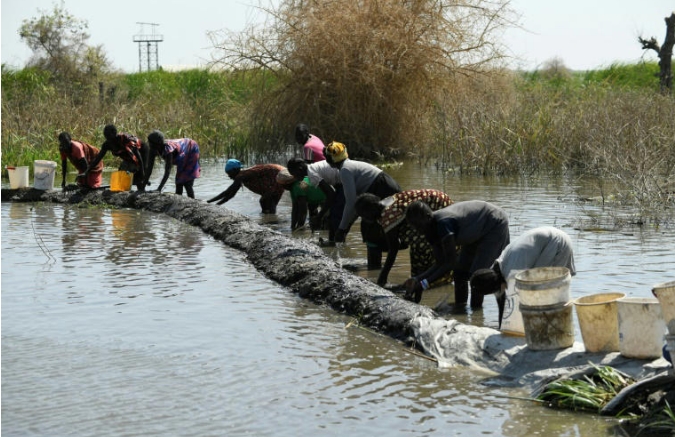AFP

Some 893,000 people have been affected by flooding in South Sudan and more than 241,000 displaced, the UN’s humanitarian agency OCHA said Thursday in a grim update on the disaster.
Aid agencies have warned that the world’s youngest country, highly vulnerable to climate change, is facing its worst flooding in decades.
“Flooding continues to affect and displace people across the country,” the United Nations Office for the Coordination of Humanitarian Affairs said in a statement.
“Heavy rainfall and floods have rendered 15 main supply routes impassable, restricting physical access.”
OCHA said about 893,000 people were flood-affected in 42 of South Sudan’s 78 counties as well as the Abyei Administrative Area, a disputed zone claimed by both Juba and Khartoum.
It said Unity and Warrap states in the north of the country accounted for more than 40 percent of the affected population.
More than 241,000 people were displaced in 16 counties and the Abyei area “seeking shelter on higher ground”, OCHA added.
– Floods ‘worsening’ situation –
Since gaining independence from Sudan in 2011, the world’s youngest nation has remained plagued by chronic instability, violence and economic stagnation as well as climate disasters such as drought and floods.
The World Bank said in an October 1 update that the latest floods were “worsening an already critical humanitarian situation marked by severe food insecurity, economic decline, continued conflict, disease outbreaks, and the repercussions of the Sudan conflict”.
It said an estimated nine million people, including refugees, will experience “critical needs” in 2024.
The conflict in Sudan has seen more than 797,000 refugees pour into South Sudan as of September, the World Bank said, almost 80 percent of them South Sudanese returnees.
The country also faces another period of political paralysis after the presidency announced yet another extension to a transitional period agreed in a 2018 peace deal, delaying elections due to take place in December by another two years.
Key provisions of the transitional agreement remain unfulfilled — including the creation of a constitution and the unification of the rival forces of President Salva Kiir and his foe Reik Machar.
The delays have left South Sudan’s partners and the United Nations increasingly exasperated.
UN mission chief Nicholas Haysom said on Wednesday there was deep frustration and fatigue among the South Sudanese people.
The international community needed “tangible evidence that this country’s leaders are genuinely committed to a democratic future”.
South Sudan boasts plentiful oil resources, but the vital source of revenue was decimated in February when an export pipeline was damaged in war-torn Sudan.
